Last week in Masculinity Monday: Black History Month Edition, we talked about Malcolm from Jessica Jones and how, while he's still an interesting and well-acted character, his storyline reinforces rather than examines harmful stereotypes about the black community. So this week we're going the opposite direction and we're going to discuss two male characters, and a show, that go out of their way to deconstruct myths about black masculinity. I'm talking, of course, about Terry Jeffords, Captain Raymond Holt, and Brooklyn 99.
If you're new to Kiss My Wonder Woman, you might not yet be aware of how stinking much I love Brooklyn 99. It might be only in its third season, but we've already written enough articles on it to sink a ship. Seriously. It's getting weird.
The reason I've gone so overboard in examining this show mostly comes down to how, well, good it is. Far from being the obnoxious "white guy is always right" star vehicle for Andy Samberg it originally appeared to be, Brooklyn 99 has evolved into a fascinating show where intersectional feminism is the norm, the characters love and support each other even while making silly bets against one another, and crime gets solved no matter how much literal garbage they have to dig through to do it.
In other words it's a good show that does a good job with racial, gender, and LGBT+ representation, and it's downright shocking how well they manage to be funny without ever getting mean.
The basic premise of the show is this: it's a sitcom about cops. That's about it. But, more specifically, the show follows the detectives of Brooklyn's 99th precinct. Their cases vary wildly from important murder investigations and drug taskforces - even undercover missions in the mafia - to tracking down missing grandmas and figuring out who has been painting penises on their squad cars. The show starts when the detectives meet their new Captain, Raymond Holt (Andre Braugher), a rule-loving, by the book cop who has finally risen to his dream job. Holt is determined to whip the 99 into shape, even if they all hate him for it.
Fortunately for us and the show, what really happens is a mush of Holt becoming more relaxed and personable as he begins to bond with and appreciate his team, even joining them in some of their sillier moments, and the detectives rising to Holt's challenge, becoming the cops he knows they can be. It's all very inspiring and also very funny, which is why the show works so well.
Okay. That's the background. What really sets Brooklyn 99 apart as a show, however, is not so much the setup as it is the diversity of the cast and the show's emphatic refusal to make cheap stereotypical jokes about race, gender, or sexual identity. Of the seven main characters, only three are actually white, while two of the detectives, Rosa Diaz and Amy Santiago are Latina, and Captain Holt and his sergeant, Terry Jeffords (Terry Crews), are African-American.
It's rare for a show to be willing to put two people from any single racial category together on the same show for fear that it will become a "Latinx show" or a "black show". The decision for Brooklyn 99 to ignore this piece of conventional wisdom is therefore pretty surprising and very refreshing.
But let's get down to actual brass tacks here: why are Terry and Captain Holt such interesting examples of black masculinity? Well, to put it simply, they both shatter our expectations for what African-American men are "supposed" to look like on TV.
We'll start first with Terry who visually fits with a certain stereotyped understanding of black masculinity but personality-wise couldn't be further from it. See, Terry Jeffords is a big man. Really big. He's tall and strong and covered in very impressive muscles. This fits with our expectation that black men be inordinately athletic in comparison with men of other races and could easily have played into a stereotype about how black men are all brawns and no brain. Fortunately for us, the show doesn't go there.
Instead of playing Terry's physical perfection as a simple fact of his black male athleticism, the joke is actually that Terry is not a naturally fit person. We are told as early as the pilot that Terry used to be quite obese and has used diet and exercise to reach his current state. It's a plot point in most of the episodes that Terry exercises constantly and prefers eating yogurt and shopping at Farmer's Markets. He's not naturally buff because he's black, he's a man who has put a lot of honest effort into getting into shape. So there's that. (Also there are several episodes where he backslides and starts gaining weight again, which are both funny and also incredibly honest in their portrayal of food addiction.)
The show goes even further than this, though, when it comes to Terry's attitude towards getting in the field. Our stereotypical inclination would be to assume that Terry is aggressive as he is buff, which is to say very. As usual, the show doesn't take the cheap shot. Instead we get a long and interesting plotline about how Terry doesn't go in the field anymore because since the birth of his twin daughters, he's been terrified of getting hurt and leaving his babies without a father.
Not what we expected, right? Not only does this storyline end up being way funnier than any jokes about Terry being hyper-aggressive would have been (a gigantic man hyperventilating as he tries to remember how to aim a gun at a target), it also opens us up to a whole new character dynamic: Terry as devoted and involved husband and father.
If we're looking at negative media stereotypes about black men, the idea that all black men are bad fathers or absent ones is a particularly pernicious one. Terry contradicts that idea full stop by being a very involved father and a very loving husband. When his wife wants to go on an experimental diet because she's worried about her baby weight, Terry tells her he doesn't care what she weighs but goes on the diet with her anyway. When his daughters Cagney and Lacey are trying to get into preschool, Terry doesn't just do research, he freaking bends over backwards to make sure that his babies get into the best possible school they can. Why? Because his girls are going to be co-presidents one day, dammit.
It's this kind of involvement and obvious love that is so lacking in media portrayals of black fathers (and frankly fathers in general). Terry's not afraid of coming across as feminine or weak - he even at one point shouts about how "Terry is in touch with his feminine side!" His favorite pastime involves bubblebath and a glass of wine. He might get frustrated while trying to put together a Fairy Princess Castle for his daughters, but that's only because his hands are too big for all the tiny pieces.
In other words, Terry Jeffords is a complex and really compelling image of black masculinity. He's strong and emotionally aware to a level much greater than anyone else in the precinct, and did I mention he's smart? He's super smart. He literally hangs out with Neil DeGrasse Tyson, that's how smart he is. One of the storylines in season three involves Holt pushing Terry to take the exam that will allow him to advance to lieutenant, the next step towards Terry getting his own command.
Terry's incredibly good at his job, whether it involves catching bad guys or making sure that his "stupid grown up kids" aren't fighting and are doing all their work.
It would be fair to call Terry the "mom" of the precinct, and what's even better is that Terry would view that as a compliment not an insult. He respects the hell out of women, and is constantly advocating for his detectives to be more emotionally sensitive in their work. Basically, Terry is one walking example of how you shouldn't judge a book by its cover. More than that, though, he's also a clear sign that the writers of Brooklyn 99 have chosen very intentionally to deconstruct all of our preconceived notions about black masculinity. Which brings me to...
Captain Raymond Holt is a character we're all expecting to understand without much explanation. He's the tough no nonsense black guy in command, right? We've seen this trope a million times - and why does every disaster movie insist on having a black no nonsense president in it? - so there's no way that Captain Holt could surprise us. Except there totally is. Didn't you read the introduction to this article?
Rather than being an amalgamation of all of our ideas of what a black man in power is supposed to look like, Raymond Holt really is his own character. He has flaws and faults and quirks, just like the rest of us. What the show does incredibly well is show us this facade, the stoic commander, and then show us what's going on behind it. It does this in a couple of ways.
First off, the most immediate thing to notice about Captain Holt is how deadpan he is. It doesn't matter if he's ecstatic with joy or in the depths of despair, his face pretty much never changes. It's enough to become a long-running joke, where the other members of the precinct will try to guess what his mood is and are always way off. But what's interesting here isn't how Holt is all stoic and stuff - we're used to our fictional black leaders being too manly for emotions - it's how Holt doesn't think of himself as emotionless.
That's a really important distinction. See, the joke isn't that Holt is holding in his feelings, it's that no one can tell what they are. He's expressing them all right, but they're just very very very subtle. Presumably. As a point of note, we discover soon in the show that Holt's husband, Kevin (Marc Evan Jackson) can tell what Holt's mood is and is actually just as deadpan. So the joke isn't that Holt doesn't have feelings or that he's too badass for them, it's that no one can read him. He's not the joke - everyone else is.
This may seem simple, but it's actually a very different way of looking at black masculinity. Typically stereotypes can go one of two ways with black men. Either they are characterized as being hyper-emotional, prone to flying off the handle at the simplest things and hard to reason with, or they're shown to be too noble and good and righteous for feelings. Like we're talking stereotypes about hotheaded gangsters versus stereotypes about magical negroes. Holt, thankfully, fits neither of those stereotypes, instead forging his own path.
He's not the type to blare his emotions all over everywhere, and his feelings certainly aren't what one would consider over the top and out of control. I mean, he is a man whose idea of romantic language is stating the technical dictionary definition of marriage. He cries over statistical analysis. He's a giant nerd is what I'm saying. But he's also not a man who is pushing aside his own feelings so that he can help some nice young white man learn a big moral lesson. Sure, Holt does teach Peralta (Andy Samberg) the occasional moral lesson, but he doesn't sacrifice his own personhood to do it.
Instead of being a conventional trope that dehumanizes him as a black man by making him either less or more than human, Holt's personality and relative lack of emotional expression just makes him kind of weird. It's the sort of interesting personality quirk that's read as funny and offbeat in a white character but in a black character is subject to dozens of thinkpieces and deep introspection. Holt's a person, and his personality is just one aspect of that.
Admittedly, his personality does make him come off as rather severe at times, what with no one ever knowing if he's smiling or not, but the show undercuts any attempts to idolize Holt by making him just as petty and human as everyone else. He might be deadpan, but he's also kind of childish in the best possible ways. He enters into ridiculous bets with Peralta over who is a better detective. He can be persuaded to use dramatic codenames and say catchphrases when he captures a bad guy. He takes hula hooping classes with Kevin and is happy to taunt Peralta with this information. Holt's kind of a goofball, even if he refuses to let anyone see it.
Hell, speaking of petty, the most worked up we ever see Holt is when he's tangling with his arch-nemesis, Madeline Wunch (Kyra Sedgewick). Wunch and Holt have known each other for years and loathed each other almost as long, and seeing the normally staid and rule-abiding Holt break down into awful elementary school level taunts is both hilarious and sobering. It's a reminder that he's very human at the core of things, and it's also very funny.
Okay, so definitely Holt is an interesting character because of how he subverts our expectations of what a "black leader" or "exemplary black man" should look like. But we can't talk about Holt without talking about the fact that he is also an out black man and a man who has been openly gay in the New York Police Department since the 1980s. That's a huge part of his character. At the same time, a big deal here is that it's not more of his character. Holt's being gay is a fact about him sort of like the fact that he loves fancy wine and quantifiable data. It informs his character but doesn't define him.
It's also worth noting that this is another place the show manages to mine humor from an unlikely place: it honestly tells the story of what it was like for Holt to be a black, gay cop in an openly racist and homophobic police department and manages to make it funny.
Only we don't laugh at Holt, we laugh at everyone else. We laugh because they can't recognize how obviously superior Holt is as a detective, and we laugh a little bit at his afro and mustache that he wears in all the flashbacks. But mostly the point here is how well the show manages to explain the gravity of Holt's past while also not letting it turn him into a tragic figure.
This is one of the other really common tropes with black characters, especially black men who've been through some level of adversity in the narrative. Frequently the story will turn them into nobly suffering victims, people defined by what has happened to them. Or, even if it allows them to get past it, it still makes these people into characters who only every think about racial injustice or inequality or important big things and who never punch the air in triumph because they accurately predicted one of their coworkers was stuck in a line at the bank.
Holt is nothing like we expect him to be because our expectations are flawed. Instead he's a well-rounded and interesting character. That's good writing. It's also good humanizing - by making Holt more than just one more heroic but cardboard thin picture of a black man in power, Brooklyn 99 gives a realistic portrait of one particular man. There's a lot of value in that.
I guess what I'm trying to say is that Brooklyn 99 doesn't cut corners when it comes to representation. It's a show not only committed to diversity in its casting but also in its characterization. The people on this show are more than just laugh factories with nothing behind them. Terry and Holt in particular are nuanced and important representations of healthy black masculinity, a black masculinity that has been intentionally interrogated and studied.
These are characters we can appreciate because, while they have flaws (like all good characters), they're complex enough to still be compelling images of what it looks like to be a black man in today's society.
Brooklyn 99 is great. If you aren't watching it I sincerely urge you to get on that. But if you take away nothing else from this article, please understand this: it's not just good politics and good representation to make your characters unique and non-stereotypical. It's also good humor. And since this is a sitcom, I feel like that's a pretty big deal.
 |
| It's just so good. |

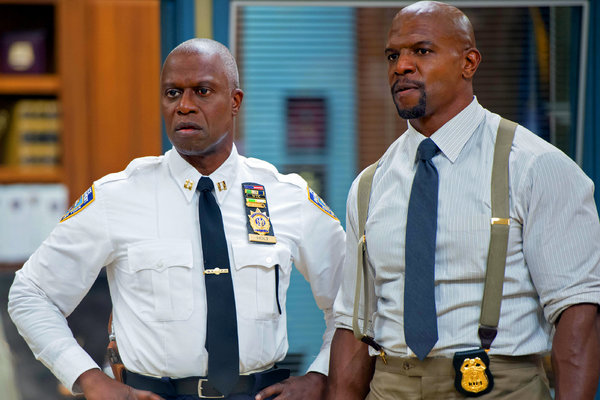
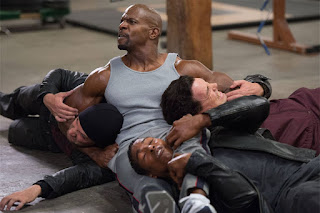
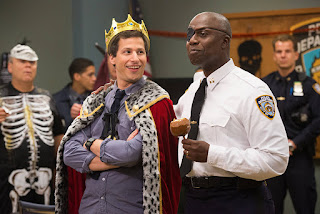

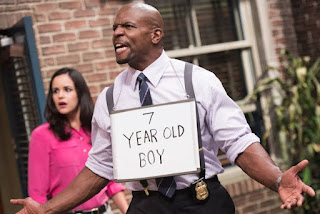
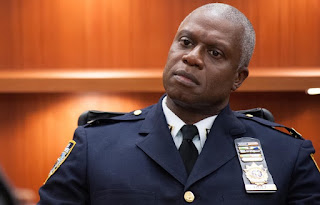
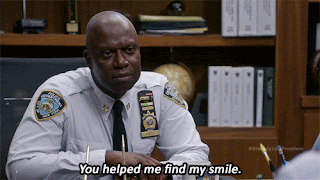
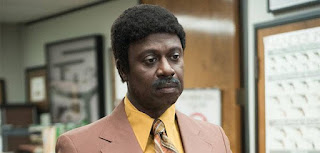
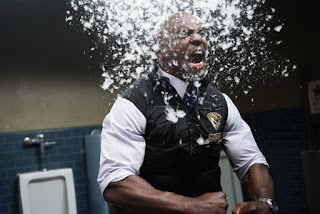

ESCORT SERVICES
ReplyDeleteKOLKATA SEX
CALL GIRL IN KOLKATA
ESCORT SERVICE IN KOLKATA
GIRLS WHATAPP NUMBER
ONLINE GIRLS
FEMALE ESCORTS
FEMALE ESCORT
CALL GIRL NAME AND MOBILR NUMBER
CALL GIRL KOLKATA
ESCORTS SERVICE
MASSAGE IN KOLKATA
GIRLS PHONE NUMBER
INDIAN MASSAGE PARLOUR SEX
ESCORTS SERVICES
CALL GIRLS NO
CALL GIRLS KOLKATA
BEAUTIFUL SEXY GIRLS
ESCORT KOLKATA
ESCORTS KOLKATA
ESCORT IN KOLKATA
ESCORTS IN KOLKATA
COLLEGE GIRL HOT
ESCORT SERVICE KOLKATA
KOLKATA VIP ESCORTS
KOLKATA HIGH PROFILE ESCORTS
KOLKATA COLLEGE ESCORTS
KOLKATA INDEPENDENT MODEL ESCORTS
KOLKATA CALL GIRLS ESCORTS
Can anyone show me the detailed-guide-on-how-to-sign-a-pdf-online-in-signnow. As I am a new user here. I heard it the simplest guide for new users and aspiring writers too.
ReplyDeleteVery educating story, saved your site for hopes to read more! royal green
ReplyDelete